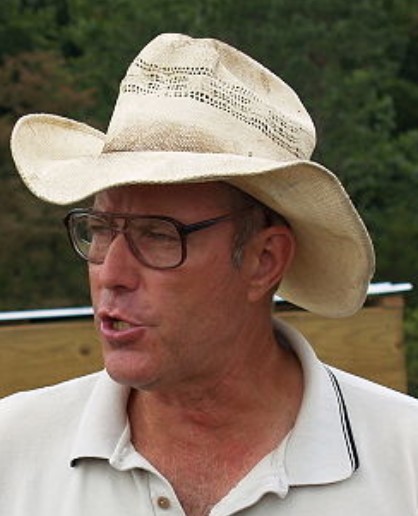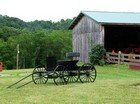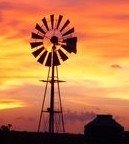An Interview with Joel
Salatin, the
most Influential Farmer in America
A farmer at Polyface Farm, Virginia, Joel Salatin decided long ago that he would not sell his food to locations further than a 4 hour-drive radius from his farm. Joel encourages the "eat local" movement as a result, making sure that that money remains in the community, and encourages people to grow their own and make their own. Now famous for his salad bar beef and his chicken tractors, Joel is a leader, not a follower, an innovator who finds complacency an anathema.
Joel Salatin spends a lot of time on the road speaking at various locations both locally and abroad. He is also the author of 10 books, his latest. "Folks, this Ain't Normal" is his latest book. See below for details.
So, I would like to thank Joel for taking the time out of his very busy schedule to answer my questions which I hope will give you insight into the world of Joel Salatin and the reason behind his thinking and philosophies. Truly a man to admire for his ceaseless work within his community and his tenacity of chipping away at the bureaucratic cliff face, hoping that eventually his words will make a difference.

Question 1 to Joel Salatin:
Joel, when reading about you and your frustration with government regulations and regulators, would it be a fair assessment to call you a rebel with a cause? Do you think that you will be able to make a difference? A lot of people are hoping so!Funny you should ask. Actually, I write a bi-monthly column for Flavor Magazine (a regional food and farming journal) titled "Rebel with a Cause." if I didn't think I could make a difference, I would have quit speaking and writing long time ago.
I think the message of food choice resonates with everyone. It's one of the most reasonable requests citizens can make of their government: "Let me choose what I eat." It seems like such a no-brainer request that it's hard to believe that in developed countries like Australia and the U.S., the powers that be summarily believe people should not be able to choose what they eat.
The ultimate rationale for this notion centers on the answer to this question: "Who owns me?" if I own me, I should be able to choose my food, along with my education, my vocation, my retirement plan, my religion, my friends. If I don't own myself, of course, the apparently the government owns me and that is, indeed, a slippery slope toward totalitarianism.
As I see it, the real challenge is not in getting people to understand this issue; the challenge is in getting this issue to a table for discussion . . . anywhere. With supermarkets full of re-packaged corn and soybeans, obesity on the rise, and party chips in the pantry, it's hard to sell the idea that we don't have food choice. The vast majority of people are not interested in choosing raw milk, Aunt Matilda's homemade pickles, or on-farm-processed meat and poultry.
Trying to create an interest in something people don't miss is absolutely the hardest problem. It's hard to lobby for something people don't want. And yet the people who want this freedom realize that sooner or later many more will realize the deficiencies in the modern mechanical food system and join them in asking for alternatives. We have to win this because our children's future health depends on something other than Monsanto's transgenic modified factory-farmed amalgamated extruded reconstituted spam.
Question 2 to Joel Salatin
People have said that your symbiotic farming practices are unique, that you are a leader not a follower in sustainable farming. For those who don’t know about your farming methods can you tell our readers what you do?Our mission statement is simple: to develop environmentally, emotionally, and economically enhancing agricultural prototypes and facilitate their duplication throughout the world.
Ultimately, this means we're in the healing business: land, health, and economy. We do this by trying, as closely as possible, to duplicate nature's templates, or patterns. In nature, ecosystem exercise occurs via disturbance and rest. Fire is both a destructive and regenerative agent. A herd of buffalo or wildebeest is also a destructive and regenerative agent. The disturbance-rest cycle freshens the ecology, exercising it to greater diversity and ultimately, to more conversion of solar energy into biomass. The biomass growth, harvest, and decomposition cycle is what builds soil.
Natural systems rely primarily on fire, herbivores, and perennials to maintain this carbon cycle. Nature doesn't till, except in rare occasions like volcanoes or floods. Tillage should be a last resort. The centerpiece of virtually all civilizations is the herbivore, both for draft power as well as nutrient density because prior to cheap energy and machinery, the herbivore could thrive on perennials. Until extremely recent times, tillage was expensive and difficult.
In nature, animals move around. They don't stay in the same place. In fact, this is the way nature moves fertility that naturally gravitates from ridges and slopes into valleys; back up onto the high ground. Predation pushes animals to sleep and lounge on high ground so the prey can see their adversaries. This maintains the fertility cycle.
In nature, animals and plants have symbiotic relationships. You don't see mono-cultures and mono-species in nature; everything has an intricate relationship that stimulates health and ecological progress.
As a result of these patterns, on our farm, we minimize tillage to the garden and keep everything in perennials. Although we buy grain from neighbors, we utilize our perennials, both grasslands and forests, in a way to make sure the omnivores (chickens, turkeys, and pigs) ingest as much perennial as possible. Tillage destroys soil. The less we till, the better. And yet our culture subsidizes six tillage species to stimulate their cultivation--to the unprecedented detriment of our soil and nutrition.
We move the animals daily to new paddocks using high tech electric fencing and lightweight portable shelters. This portable infrastructure, invented only in recent decades, enables large production, for the first time in human history, to be done in a more hygienic, sanitary, animal friendly, and ecologically-enhancing way than ever before. We live in marvelous times.
In the winter, chickens, pigs, and rabbits move into hoop houses (tall tunnels) on mezzanine floors and deep bedding to stay warm. When they come back out to pasture in the spring, these hoop houses are planted in vegetables for season extension and space utilization. We let animals do the work. Chickens follow the cows in egg-mobiles, sanitizing the pastures, scratching through the dung, and converting grasshoppers and crickets into the best eggs in the world. Pigaerators convert deep winter bedding from hay-fed cows into wonderful aerobic compost, which feeds the carbon cycle and supplies the farm's fertilizer.
Movement, carbon cycling, portability, rest, and periodic disturbance (grazing) offer intricate bio-mimicry, higher production than average, and a most fascinating life.
Question 3 to Joel Salatin
How is this different to mainstream organic farmers and what caused you to look at farming differently?
Just reducing chicken population numbers in a factory house so the birds can be certified does nothing for the nutrient profile. It still does not offer sunshine, green grass, and the ability of the chicken to express its chicken-ness.
In all honesty, I think what caused our family to look at things differently was economics. Ultimately, substituting inputs is not the way to make a profit. If we are going to fundamentally change energy requirements and tap into a solar-driven farm, we have to reduce the inputs, localize the carbon cycle, reduce infrastructure, and perennialize food production.
Question 4 to Joel Salatin
Can anyone do what you do on your farm? Some people say they can't.The only people who can duplicate what we've done are the ones who have enough persistence, cleverness, character, integrity, and right thinking to do it. That eliminates most people, which is a great fire wall of sales protection. Ha!
I wish I had kept count over the years of all the people who showed me their weed-enshrouded pasture poultry shelters that didn't work. They were made out of heavy timbers, sheet metal, and weighed 500 pounds. Of course it didn't work.
This is an art as well as a science. That means no cookie-cutter formula exists. These principles have to be adapted to your neighborhood, climate, family resources, etc. And remember, a successful farm is a business, not a hobby and not just a hole to throw money into. We don't have a horse at Polyface (Farm) because we haven't figured out how to make one pay.
I'm a proponent of low living expenses. Live in a trailer if necessary. Lots of people buy a farm and then build a $200,000 house, then claim they can't make it work. The creativity people have to louse up something this simple is truly amazing. If you call me for advice, and I start giving you some, and each time I take a breath you jump in with a, "That won't work here!" Then I have one answer: "Of course you won't be successful."
If it has been done, then it can be done. I wrote "You can Farm" to explain all the processes and thinking that went into our success. Some people say, "That's a hard book." Well, this is not lolly-gagging around sipping coffee at 10 a.m. waiting for the day to start. Unfortunately, too many people don't realize the truth of Pa Ingalls, in "The Little House on the Prairie" books, who said: "What most people think of as luck is really just hard work." Amen, Pa.
Question 5 to Joel Salatin
What is your biggest hope for change within current farming practices today and why?
My biggest hope for change is in the local food movement and the entrepreneurial innovators that are creating this new food model. This includes Shannon Hayes' "Radical Homemakers" who are entering their kitchens again, discovering domestic culinary arts, and opting out of the processed food system.
The local food movement brings together many aspects. In order to sell locally, a farm must be aesthetically and aromatically sensually romantic. Local patrons won't abide a factory farm. The transparency, accountability, and integrity inherent in a close chain of custody, or a community-embedded food system, creates its own checks and balances on abuse. Word gets around pretty quickly who the good farmer/food processors are and who the charlatans are.
Localization, in all its many forms, is the antidote for the things that trouble us, from toxicity, to pathogenicity, to just plain feeling that nothing i do can make a difference. It does. The reason things are the way they are is because too many people allowed their decisions to abdicate responsibility toward our ecological umbilical. Once more of us begin taking that responsibility seriously, the culture will reflect the cumulative effect of those individual decisions expressed on our landscape. And that can heal what is unwell. And that, my friends, is a legacy we should all aspire to leave.
Joel, many thanks for your time and effort in spreading the word on organic farming and sustainable living.
JOEL SALATIN RESOURCES: - BOOKS, VIDEOS AND A WEBSITE
Books Written by Joel Salatin and Shannon HayesJOEL SALATIN VIDEOS
POLYFACE FARMS : PART 1
POLYFACE FARMS : PART 2
POLYFACE FARMS : PART 3
For more information visit Polyface Farms.
If you would like to advertise your farm in Europe for free because you need some help on the farm to pick those crops, or whatever, see our section on farming jobs worldwide. Or, if you want to advertise your farm produce, farm accommodation or a farm service look at our section Advertise your Farm. Please feel free to contact us for any further inquiries.
Leave a Comment for our
Joel Salatin
Page
Do you have anything that you would like to add after reading this page? We would love to hear your thoughts. If you can add additional information to what has been written here you will be adding value to the website! No need to have any special skills - just type and submit. We will do the rest!
Leave a Comment
Do you have anything that you would like to add after reading this page? We would love to hear your thoughts. If you can add additional information to what has been written here you will be adding value to the website! No need to have any special skills - just type and submit. We will do the rest!
Other Comments
Click below to see comments from other visitors to this page...
heal yourself 




I am inspired by what Joel is doing for humanity. Unltimately he is not only healing the land and producing the most nutritous food. He is allowing us …
Joel Salatin Keep it up! Not rated yet
Thank you for the Jole Salatin interview. I am in the middle of reading Joel's book, "You Can Farm", and I can't wait to learn more about his concepts …







New! Comments
Do you have something of value to add? Leave me a comment in the box below.